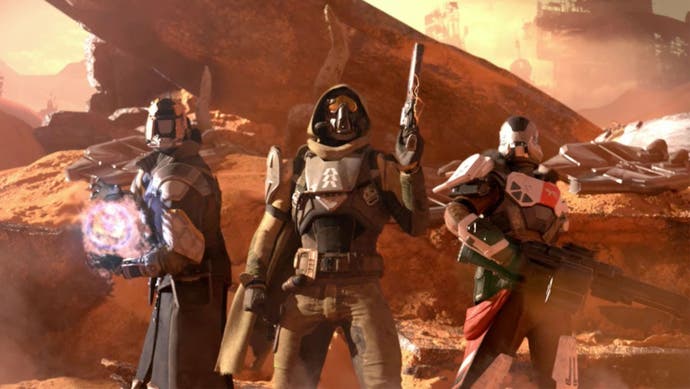What can player profiling tell us about games?
The anarchist playbook.
Imagine you have just hit 'start' on a new first-person video game. You find yourself in a room facing a doorway with 'this way' written in large letters over the top. You take a very quick look around and notice a few closed chests and cupboards beside you and then a door behind you marked 'no entry'. You turn back toward the first door. Without thinking, answer the following question: what do you do now?
In 1990, Dr Richard Bartle, the co-creator of the seminal online role-playing game Multi-User Dungeon (MUD), wrote an essay categorising the sorts of people who inhabited multiplayer adventures. He broke them up into four types: achievers, who like to level up and beat objectives; explorers, who just like to progress through the environment seeing new stuff; socialisers, who are really there to meet people; and killers who just need to subvert everything and ruin the experience for everyone else. His taxonomy of players would go on to become a hugely influential study of gaming habits, and can easily be applied to other genres beyond MUDs - you most likely recognise yourself among those categories.
But Bartle isn't the only academic to wonder about the types of people who play video games. There has been a really fascinating history of psychological profiling in this industry. It is possible, for example to categorise gamers along financial lines. In his series of essays entitled A New Taxonomy of Gamers, writer Mitch Krpata identifies two types of player: wholesale gamers, who see the value of games in their length, and simply wants to get as many hours as possible out of their purchase, and premium players, who value the intensity and quality of the experience. This is a very useful way of framing the current argument over titles like Firewatch and Everybody's Gone to the Rapture, which are short in terms of completion time, but very rich in terms of the universe and the experience they present to the player.

Elsewhere, psychology professor Shane Murphy wrote a paper in 2009 asserting that, with the increasingly technological nature of sport, sports psychologists could learn a lot from studying the behaviour - and types - of video game players. He identified four different categories: high ego, high task players who are extremely competitive and want to be recognised as winners; low ego, high task players who are skilled but prefer to operate in co-op teams or alone in single-player adventures; high ego, low task players, who want to win, but don't want to put the time in to learn the skills; and low ego, low task players who are just there to socialise.
The whole idea of player profiling has always fascinated me, because it is simultaneously an unspoken and vital element of game design. Developers rarely talk about the need or desire to categorise their audience, but yet, if you look at the shooter and role-player genres, both are geared around the understanding that different people play games in very different ways. In the FPS field you have snipers, tanks, and support players who happily take on medic roles. In RPGs you have the in-built class system with four basic types: warrior, cleric, magic user and thief. Ostensibly, these exist to add variety to combat encounters, but they're also facilitating very different personality types. Indeed, in the 1970s, the psychologist Dr. David Keirsey identified four basic human temperaments - guardian, idealist, artisan, rational - and his resulting personality test, wonderfully named the Keirsey Temperament Sorter, is used as a recruitment tool by big companies like Coca Cola as well as the US government. Intriguingly, his four temperaments, overlay very accurately with Bartle's four player types. Which basically makes video games a great way of testing personalities and motivations. How you behave in Destiny may say more about you than you think.
So why is this interesting? Well apart from trying to figure out which category you belong in (and it may well change from week to week, or over a longer scale as you age), it's also something that developers really are having to think about in a much more explicit way. As worlds open up, as skill trees blossom, as co-op and multiplayer elements become more complex, game makers are having to think about gamers as a more diverse and demanding audience. Last year, I spoke to Harvey Smith, the veteran game designer behind Dishonored. He said that they'd worked hard to include devious non-lethal powers and takedowns, and that watching gamers work these out was a fascinating and instructional process.
"Some people play the game and they don't do any of this," he says. "They just butcher their way through everything. And really, they're followers: 'the text told me to kill that guy so I killed him'. But other people are like, 'the game offered me these options, but I deliberately went the opposite way'. We hear that a lot with the games Bethesda work on. You start Skyrim or you start Fallout and in the distance you see where they're telling you to go - but the most fun thing to do is turn 180 degrees and go in that direction. Bethesda's games support that; you'll usually find something cool.
"So we have the followers, the rebels, and then we have the deep lore people, the ones who just spend their time as tourists, exploring every nook and cranny, reading every document. They often ask, can you do a version of the game with the combat taken out? It's very interesting. But if you support those things, people are able to differentiate their experience and that's really valuable."
But I actually think that value is now higher than ever - and I think one type of gamer is going to rise to prominence over the next five years. Let's go back to that opening paragraph. What did you choose to do? Did you go right through the door in front? Did you investigate the cupboards then go through that door? Okay, that's all cool, but you sort of failed. Did you turn round and go straight into the door that you weren't supposed to? Congratulations, you're going to be super useful.
The thing is, we're moving into an era of games as platforms. Of course, we've already seen that in the smartphone, social and MMORPG sectors, where games are released in a basic form then iterated based on player actions, then augmented with new levels and features, again based on the activities of the audience. Game design for companies like Supercell, Zynga and Nexon has become about gathering player metrics and understanding their behaviours. Because in these sectors, retention and engagement are the key concerns. Now, in the mainstream console and PC gaming industry, we're seeing the same stuff happening. Destiny, the Division, the skeletal semi-episodic structures of the latest Hitman and Street Fighter titles are going to rely heavily on their ability to capture and retain players - and part of that is going to involve studying metrics, habits and statistics and changing the games accordingly. And it's probably going to be the outliers, the rebels who really test the systems, who are going to be most interesting. After years of attempting to legislate against misfits with things like Punkbuster and ban hammers, those guys become super valuable in the era of iteration and live public QA testing.
More importantly, a key part of this brave new era will be games that psychologically profile us as we play. Look at Netflix for example - that system knows what you're watching, how long you watch for, which sections of a movie or TV show you are rewinding or forward-winding past and all your browsing and selection habits. Why does it collect this data? Because Netflix, as a subscription service, is in the business of retention. It needs to ensure you keep paying that monthly fee and to do that it needs to know you and provide a service built for you, using complex analysis and algorithms to shape the interface and the selection to your tastes.
This is where games are going. Xbox One, Steam and PS4 are working like Netflix now - they're not selling you games, they're selling you services and they need to keep you onboard. The way they'll do this is through psychological and activity profiling - they want to know what makes you tick so they can make sure the sort of games you'll like will pop up on the main screen, and that those games will contain play styles you'll engage with. It's a future Richard Bartle probably didn't foresee when he came up with his taxonomy of players, but it's here now. The fact is, even if you don't know what type of player you are, very soon, the developers will, and they will make sure you get what you want, however weird, twisted and anarchic that may be.



.png?width=291&height=164&fit=crop&quality=80&format=jpg&auto=webp)






